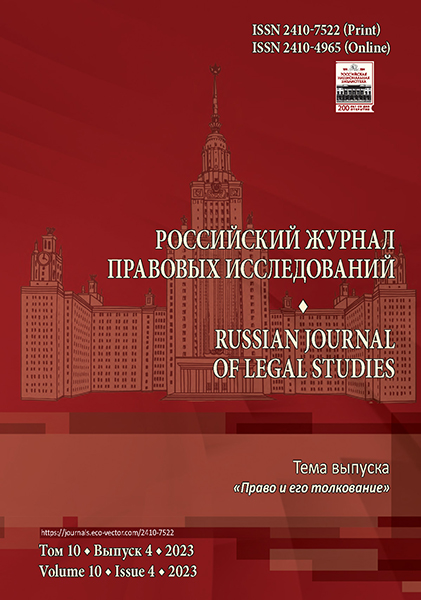Юридические клиники в негосударственной системе бесплатной юридической помощи: проблемы и перспективы (на примере Юридической клиники Воронежского государственного университета)
- Авторы: Катинская Е.С.1, Катинский В.Г.1
-
Учреждения:
- Воронежский государственный университет
- Выпуск: Том 10, № 4 (2023)
- Страницы: 75-82
- Раздел: Публично-правовые (государственно-правовые) науки
- Статья получена: 05.10.2023
- Статья одобрена: 07.11.2023
- Статья опубликована: 25.12.2023
- URL: https://journals.eco-vector.com/2410-7522/article/view/604861
- DOI: https://doi.org/10.17816/RJLS604861
- ID: 604861
Цитировать
Полный текст
Аннотация
В статье рассматриваются основные направления совершенствования правового регулирования деятельности по оказанию бесплатной юридической помощи юридическими клиниками. Отдельно освещаются актуальные вопросы, связанные с определением категорий лиц, правомочных обратиться в рамках негосударственной системы бесплатной юридической помощи в юридическую клинику, с отсутствием оснований для отказа в ее оказании; оцениваются установленные правовыми актами требования к клиницистам, возможность оказания правовой помощи в форме представительства, целесообразность консультирования граждан студентами при обязательном присутствии курирующих преподавателей. Также обосновывается необходимость внедрения локальных нормативных актов и регламентов в каждой юридической клинике. Значимым и в то же время пробельным является вопрос о единстве в понимании содержания деятельности юридических клиник, о единых стандартах деятельности, гарантиях качества оказания такой помощи, которые тесно связаны с механизмами контроля со стороны государства. Поднимается вопрос о регулировании и финансировании деятельности юридических клиник, в том числе о порядке функционирования автоматизированных систем и обработки ими персональных данных. Авторы статьи предлагают внести изменения в действующее законодательство в части оснований отказа в оказании бесплатной юридической помощи юридическими клиниками. Также на примере Юридической клиники Воронежского государственного университета уделяется внимание подходам к вступительным испытаниям и обучению по программе «Модельная юридическая клиника», сотрудничеству с органами государственной власти и некоммерческими организациями. В статье делается вывод о необходимости дальнейшего развития и поддержки юридических клиник в системе бесплатной юридической помощи, а также о необходимости решения существующих проблем для повышения качества предоставляемой помощи и достижения большей доступности для населения.
Ключевые слова
Полный текст
Об авторах
Елена Сергеевна Катинская
Воронежский государственный университет
Автор, ответственный за переписку.
Email: es-katinskaya@yandex.ru
ORCID iD: 0009-0008-2126-3578
соискатель, преподаватель
Россия, ВоронежВладислав Геннадьевич Катинский
Воронежский государственный университет
Email: vladislav-katinskiy@yandex.ru
ORCID iD: 0009-0008-2038-3658
преподаватель, старший консультант
Россия, ВоронежСписок литературы
- Малютина О.А. «Юридические клиники помогут всем», или Кто вправе рассчитывать на бесплатную юридическую помощь? // Юрист. 2019. № 6. С. 72–76.
- Метелев А.П., Белановский Ю.С., Горлова Н.И., и др. Организация добровольческой (волонтерской) деятельности и взаимодействие с социально ориентированными НКО / под ред. И.В. Мерсиянова. Москва: НИУ ВШЭ, 2022. 456 с.
- Закомолдин Р.В., Закомолдин А.В., Гончарова К.С. К вопросу о выстраивании системы бесплатной юридической помощи населению // Юрист. 2022. № 6. С. 67–74.
- Черных А.В. К вопросу об оказании юридической помощи несовершеннолетним студенческими юридическими клиниками // Адвокатская практика. 2019. № 1. С. 39–42.
- Остапенко А.С., Артемьев Е.В., Бевзюк Е.А. Комментарий к Федеральному закону от 21.11.2011 № 324-ФЗ «О бесплатной юридической помощи в Российской Федерации» (постатейный) // СПС КонсультантПлюс. 2012.
- Атагимова Э.И. Роль юридических клиник в системе оказания бесплатной юридической помощи Российской Федерации: история и современность // Мониторинг правоприменения. 2021. Т. 40. № 3. С. 11–17. doi: 10.21681/2226-0692-2021-3-11-17
- Доброхотова Е.Н. Современный этап развития юридических клиник в системе высшего образования и в негосударственной системе бесплатной юридической помощи // Юридическая клиника как фактор повышения качества юридического образования: материалы VI ежегодного всероссийского экспертного семинара, Санкт-Петербург, 17 мая 2017 года. Санкт-Петербург: Санкт-Петербургский университет Министерства внутренних дел Российской Федерации, 2017. С. 18–26.
- Васкэ Е.В., Серегина Е.В Реализация права граждан на бесплатную юридическую помощь в юридических клиниках: правовой и психологический аспекты // Законность и правопорядок. 2019. Т. 23. № 3. С. 8–13.
- Трофимова М.С. Стандарты деятельности юридической клиники в негосударственной системе бесплатной юридической помощи в России // Вестник Новгородского филиала РАНХиГС. 2017. Т. 6. № 1-1(7). С. 207–213.
- Дегтярев С.Л., Решетников П.Г. Взаимодействие юридического вуза и органов прокуратуры при организации работы юридической клиники // Вестник гражданского процесса. 2020. Т. 10. № 1. С. 51–58.
- Судакова С.В., Тюрина А.В. Юридические клиники как перспективное средство обеспечения конституционного права граждан на бесплатную юридическую помощь // Конституционализм и государствоведение. 2019. Т. 16. № 4. С. 32–39.
Дополнительные файлы








